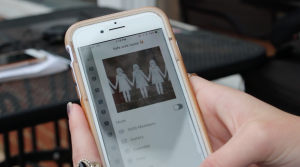News
How Ohio U Students Are Combating Sexual Assault on Campus
By: Abby Grisez
Posted on:
ATHENS — After a number of sexual assaults were reported in Athens and at Ohio University, some students are coming up with solutions to help solve the issue.
The Ohio University Police Department has sent four crime alert emails since the school year began in late August: three rapes and one gross sexual imposition. There have been a number of other reports to OUPD and the Athens Police Department of sexual misconduct in the time frame of less than a month.
Though many people on campus are feeling scared and helpless, some students are coming up with solutions to prevent sexual assault.
OU seniors Mary Ryznar and Erin Halpin started a group chat on the app GroupMe called Safe Walk Home in early September. Girls can message the group to check if someone else is walking home at the same time as them. Within 30 minutes of starting the GroupMe, it reached its capacity of 500 members. And when 500 more spots were added, it reached capacity again in 30 minutes.

Halpin was surprised so many OU women wanted to be a part of the group message.
“We never expected it to be that big,” she said. “We thought, you know, like 100 women would be in it and now there’s 1,000. And that’s – it’s so much bigger and it’s just so nice to see women help other women.”
The chat was given another expansion and is now at almost 2,000 members. Halpin and Ryznar are exploring options for a Facebook group or an app, in hopes of reaching more people.
Ryznar’s time working as a bartender at The Overhang opened her eyes to people’s experiences. She says bartenders are often a first line of defense when it comes to preventing sexual misconduct.
“We are the ones pouring them drinks,” she said. “They’re our responsibility and we’re responsible for cutting them off if they’ve had one too many, so why not be able to step in if we can tell that someone is in danger?”
The Overhang staff went through Better Bystanders training, which is an educational program at OU aimed at decreasing sexual violence through bystander intervention.
Thank you @OHIObystander for coming in and talking with us! We at the Over Hang are here to help anyone who needs it and to be a safe place for every bobcat and community member in Athens. pic.twitter.com/P86kEbYxX9
— The Over Hang (@TheOverhangOU) September 9, 2018
But during a night out, bartenders aren’t the only ones people can turn to.
Mike Oettinger, also known as DJ Hex, says DJs at the bars look out for people trying to slip something into drinks and are a good resource for people who may need help.
“I’m on par with these bartenders in terms of just seeing what’s going on,” Oettinger said. “I have a different perspective on things and I really just want to do it for our community and for the people close to me that have been affected by that.”
https://twitter.com/HexTheDJ/status/1037812847705837569
Oettinger hopes his tweet can spread awareness and inspire action.
“A tweet’s not gonna fix anything, but it’s the actions that hopefully that tweet can – people can read and say ‘oh, I can do that too,’” he said.
Social media has been a common way for students to express their anger and frustration at the current climate. It has also been a place to voice their solutions.
Matthew Shiflet, a Lyft driver in Athens, said in a tweet he would walk passengers from the car to their door.
Given the recent assaults @ohiou, I think everyone should know that we have @lyft on campus now
I don't say it bc I'm a driver. I say it bc it's safe, + quicker & less expensive than other nighttime options (like cabs).
I will personally walk you from my car to your dorm/apt.
— HaitianHomie (@MatthewShiflet) September 7, 2018
“Making sure people get home safely is more important to me than the extra couple bucks I could make by leaving you thirty seconds sooner,” Shiflet said. “Whether you’re on the job or not, we have to take care of each other and it’s crazy to me that this is an issue we even have to talk about,”
Though the long-term effects of these solutions is uncertain, it’s clear these students are trying to turn what some might call a helpless situation into something good.
“I want to help be a solution and to me, that’s more than a dollar, that’s more than money,” Shiflet said.

